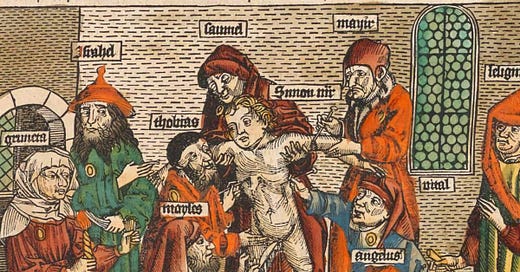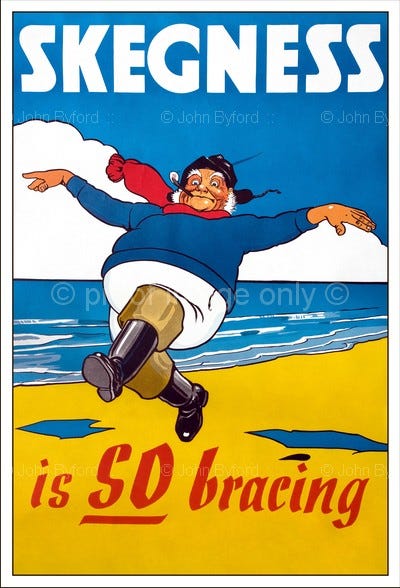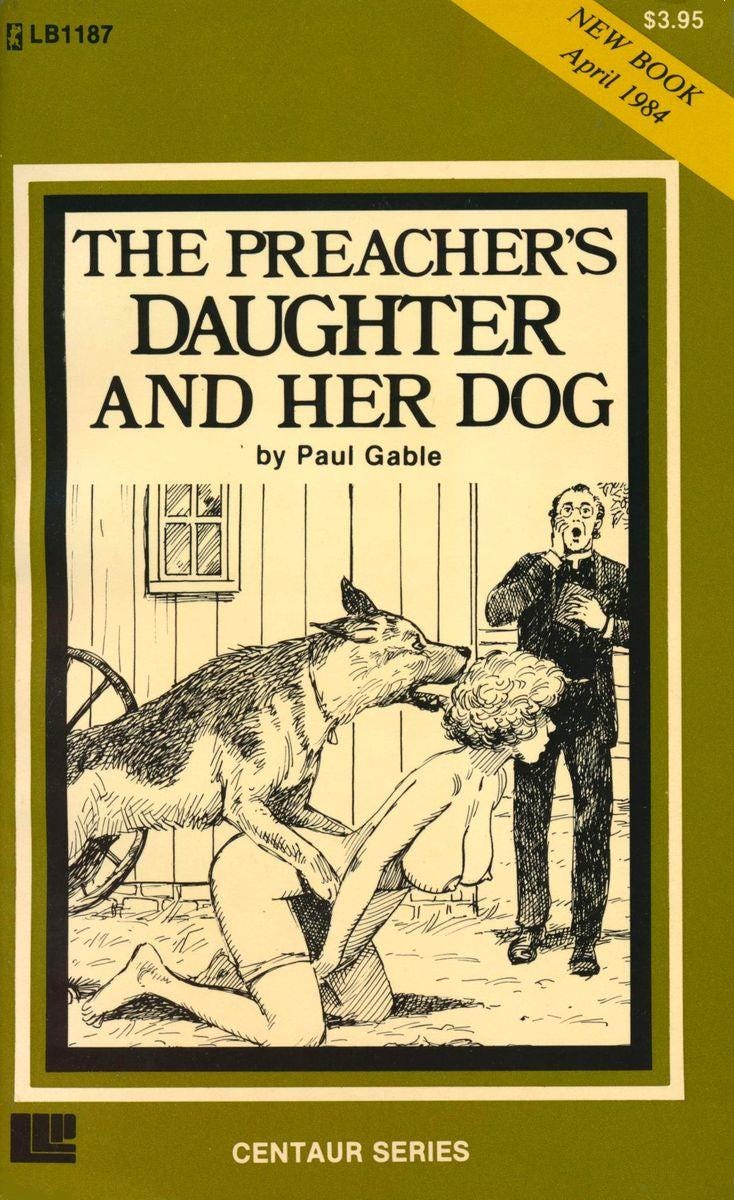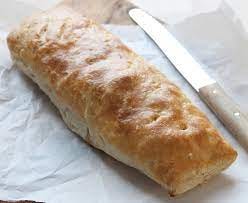[I wrote this in another century, well, 1999. I have no idea for what publication nor whether, even, it was published. No matter, the aim, after the last few excursions in grubbery and smut, is to dial things down. So I offer a little auto-biography. Our youthful hero has recently moved from a village near Birmingham, the high point of which was the friendly station master’s willingness to permit him ingress to the signal box, it self girt by monstrous fungi that would have found a welcome in the margins of any decent fairy tale, and wherein he would let off pleasingly noisy fog signals. His destination? A great county and its cathedral city.]
Lincolnshire. 1950s. Britain’s second largest county; fen-laden and flat in the south, hilly, yet paradoxically flat in the northern ‘wolds’: defined as ‘elevated, level and treeless land’; its natives rejoicing in the nickname ‘yellow (“yeller”) bellies’, the local cuisine the ‘Lincolnshire clanger’, a homebaked cousin of Cornwall’s pasty, meat at one end, jam at t’other. Known for its cathedral, the flower-filled fields of its southern section (‘Holland’), for Lord Tennyson and, latterly, for Grantham, its smalltown mores as embodied in a single politician’s being a paradigm of a nation’s decline into wholesale curtain-twitching provinciality.
We – two parents, one five year-old (my mother’s mother, still half thinking herself in Lithuania, would join us later) – arrived in 1953. After the Coronation – for that we had trekked from the village to Grandpa’s in nearby Brum for a first glimpse of TV (not to enter our own house for another eight years) – but exactly when I can’t recall. Searching for a house I encountered hotel life: the Saracen’s Head, not that far from Marks and Spencer, of which my father was manager and across from the Midland Bank whence every night he would carry the day’s take (sometimes I ‘helped’ fill the bags of farthings), a regular offering to the wall-mounted night safe. One day, not that much later, I stood in the store window, watching the Queen process by. Nearby stood a large arch dating from Lincoln’s days as Roman Lindvm. Later, after our time, a lorry totalled it. Of the hotel I recall little. Is it a Post House now, perhaps a Best Western, does it even stand? I celebrated my sixth birthday there, ‘riding’ my first bicycle around our room. Still no TV, only a radio: Saturday morning Children’s Favourites: ‘The Laughing Policeman’, ‘The Big Rock Candy Mountain’. My father bought home six pairs of pyjamas, ‘on appro’. Confined to bed with some eating ailment, I blithely and sequentially threw up on all six.
Presumably Lincoln’s premier hostelry, it attracted passing stardom. There in the dining room paraded the cast and crew of The Dam Busters, one of those seminal creations, like Reach for the Sky or Angels One-Five, the celluloid equivalent of the ‘Battler Brittain’ comics beloved of those Fifties youngsters for whom, like me, the war was simultaneously myth and experience, regularly evoked but always tantalisingly out of reach. The county was still dotted with old bomber bases, deserted now but ideal for filmic re-creation. We visited the set one day, I remember only dense fog and the odd truck; there was nothing doing.
I enrolled in school, St Mary’s up by the Cathedral, tossed into a summer classroom a year ahead of my abilities. I could spell ‘hen’ but not ‘Christopher’ and the full name was required. I did not ‘go up’ when the new year started but began again – first Mrs Bramley (she of an exciting red-inked Parker 51 and a suitably plump rubicundity) and later Mrs Hill (as tall and angular as nomenclature required) – among my proper peers. By then we had a house and every morning I would walk down Wragby Road, speeding up to pass a copse filled with (to me) vile-smelling cow parsley, slowing down at the motor showrooms to admire shiny Vauxhall Victors, two-toned and mini-finned in weak imitation of transatlantic gas-guzzlers. One day, sporting a proper catapult – forked, wooden, serious Bash Street stuff – I was stopped by a cyclist: ‘Give me that.’ ‘Why?’ ‘I’m a police cadet.’ I gave. Did not forget. Funny, the roots of liberalism. A detour brought me to Hargreaves, where later, bolder, I would treat ‘my gang’ to sweets (Caramacs, Nestlé’s Five Boys) ‘on my mother’s account, please’. Near the cathedral, especially celebrated for its gargoyles, was my first bookshop, a tiny, dusty place, run (in my memory) by some bent, Dickensian Quilp, lame and hunchbacked, swapping my carefully hoarded weeks of 6d. pocket money for a new Penguin (Sherlock Holmes, King Arthur, E. Nesbit). Too easy to place my current preoccupations amongst those crowded shelves, but then as now, I sensed that the company of books – in shops, in libraries, most satisfyingly in one’s own possession – provided security beyond all other.
We were Jewish. Not uncommon for the M&S managers of the time, less so for cathedral-dominated Lincoln where the blood libel of St Hugh (my prep school song rhyming Hugh with Jew) still lingered. Neighbouring Nottingham or Sheffield had their communities (further-off Leeds was a positive metropolis) but chez nous there was but one other Jewish family – and to them we did not, upon some edict of my mother’s, speak. Major festivals required hour-long treks to the Nottingham shul; ‘the order’, a month’s kosher meat supplies, was collected in person after a similar expedition. There was a deli in Lincoln, down by the docks, run by a Pole whom, it was rumoured, would never eat smoked salmon after having been force-fed the stuff during a sojourn in Stalin’s salt-mines. But kosher he wasn’t.
I think I liked Lincoln. My friend Luke had a lawn big enough to stage entire test matches á deux (facsimile events with left-handers dutifully if ineptly played with the left hand); I saw my earliest movies at the Regal – Bambi, Oliver Twist (bizarrely ‘A’-cert., we smuggled in a another boy, hanging around looking for an adult to escort him), but not the X-rated The Fly, the come-on for which featured a scary cardboard cut-out of Vincent Price with a fly’s head (or was it vice versa?) and the declaration: ‘The management refuses admission to any late-comers’. Given the reign of ‘Cont. Progs.’ this in itself was exciting: my mother, careless of plot, would arrive half way through and we’d leave accordingly. I yearned for a straight run. I loved the Theatre Royal where I saw the gorier Shakespeares and one panto night, parent-persuaded, mounted the stage to help the Principal Boy (fishnets, heels, layers of slap) guide my peers through that year’s up-beat singalong. (My reward, a bag of chocolate coins, was at parental diktat promptly off-loaded to a younger child: I am still bereft).
A provincial bohemia lurked nearby in Holton-cum-Beckering where, glamorously, lived ‘an artist’. My parents had friends there: drink was taken. Further yet was Tennyson d’Eyncourt, a wrecked mansion, related presumably to the poet, where once, magically, we stumbled through its crumbling, dangerous glories. Tiptoeing up one of many rickety staircases, its banisters long rotted, treads uneven and shaky, peering through gaping walls at the overgrown wasteland that once, surely, had represented a noble garden, I sensed genuine wonder. The book-besotted only child, not so much romantic but hot on imagination, could hardly side-step the potency of such vanished magnificence. Opening a cupboard door disgorged a whole biography of letters; my parents, virtuously, left them where they were. I still fantasise of return and remain in thrall to the decaying, the shattered, the shards of lost vanities. My time travels run only in reverse. And finally the coast: Skegness (‘Skeggie’) with the jolly fisherman cavorting lifesize on the poster that marked the city limits, its rows of caravans, the grey, chilly North Sea lapping unappealingly along the front. Nearer was the county cricket ground. I gloried in a job: turning numbers in the score box.
Lincoln was, after all, the last place I lived consistently at home. In 1959, typically in the Easter and not the usual Christmas term, I vanished to prep school. Home would become the place you lived least. It was still, however, in Lincs. St. Hugh’s School, Woodhall Spa, down among the potato fields (every one posted ‘property of Smith’s Crisps’). Back to the Dam Busters (flesh-and-blood this time) whose bombless nights had been spent carousing at the local Petwood Hotel. Now I went there for joyless exeats: dripping rhododendrons, smoke-stained panelling, brown windsor soup and razor-thin roast beef, vilely over-cooked. Better by far was the Kinema-in-the-Woods, not its movies (we never went) but the adjacent caff: Heinz spaghetti on toast, pure bliss after the fertilised eggs, the clumps of watercress still heavy with dense, worm-writhing earth, the brawn (Jewish, I avoided that – a boy vomited his, cane-wielding masters stood over him until he’d choked it back down) that constituted our daily rations. The odd trek to Boston, with its celebrated ‘stump’ – concert in the church, chips on the journey back – was no compensation. How could they have consigned me to this hell? There were, I imagine, better things – the library, offering inter alia a new delight: still undiscovered Wodehouse – but it’s the chilly winter fields that I recall, loamy clods rimed with frost, our wretched homesick crocodiles trudging the obligatory Sunday walk along their edges. Thirty years on, working on some project, I happened on the school once more: its science block had won some kind of prize. After my time, dear boy, and anyway, it looked like classic Sixties brutalism to me.
We were eight years in Lincoln, leaving in 1961. There has been no return. Childhood ended and I wouldn’t expect its backdrop to have lingered. I doubt that my bookshop has survived – not other than as some tacky palace of Heritage tat: Lincoln Imps, gargoyles, the usual. The Arboretum is probably a carpark, or maybe some form of Mall. The High Street’s likely pedestrianised, the rote Nineties nameplates replacing the old one-offs – a flower shop, a garage – properties of my friends’ parents. And if it isn’t – please, Lincoln councillors, don’t write in. I shan’t be back.
CODA
But back I did go. Fifty years since we had left and moved down south, resting in another film-starred hotel, where well-known figures would materialise at the weekend taking a break from nearby Pinewood, revving their open-top roadsters and debouching bar-wards to reprise their latest image.
Perhaps fittingly it was (the booking was long established) a bare ten days since my mother’s death, her burial and my discovery that as dementia had insinuated its tendrils of incomprehension, she had fallen into the hands of a lawyer (so all was legal, of course), in turn a front for a charity, who had extracted her every penny. My lawyers advised against pursuing a case. There were seven wills in all with each expanding the lawyers’ grip and their concomitant profit. As the QC to whom we spoke explained: ‘I see a three-week case, expert witnesses on each side; I see costs of six figures, the first of which need by no means be a “1”.’ But none of that impinged on my return, a literary festival, lovingly enunciating a synonymy of George Carlin’s Top Seven to an audience who were already thinking hard of their imminent elevenses.
My theories as to what had become of my landmarks were pretty useless. The Saracen’s Head, far from offering rooms for nightly rest, had become a Waterstone’s. There seemed to be no sign of the town’s chic clothes shop Ricka Down which my mother, no evidence proffered, named ‘Knickers Down’. Provincial ’ow’s-yer-father as Tony Richardson and others would place on monochrome film a decade later. (Many years on she informed me of a party - attended but definitely paws-off - in which there was what the stroke books term ‘dog-on-girl action.’)
I went back to our house: in time-honoured fashion it did seem smaller though they seemed to have improved on our rather tatty lawn. The vegetable garden, which I liked, not least for its playing host to our Guy Fawkes fireworks, was invisible. The Anderson shelter-turned-rockery, much tended and embellished, remained. I pondered ringing at the bell, rejected the thought. You can’t go back and if you think otherwise, don’t. As for the High Street, the toy shop, which one year was part of a nationwide compo, its prize one minute to grab any and everything one lusted after. Prep was regular visits, constructing a route, climbable shelves, could a helper carry the loot? Maybe someone won. I didn’t. No sign now. I retraced my steps to school. Cow parsley had succumbed to new-builds. Outside St Mary’s a group of mothers, perhaps grandpa didn’t usually appear, quizzed me. I explained. All smiles they suggested I walk through the gardens and into the school. It was, they explained, its very last day. All would be shuttered come tomorrow. I still resisted.
Of course my madeleine remained the bookshop. Books were there, on appositely named Steep Hill. But ‘mine’? I toured a few, even questioned their owners. They weren’t old enough and I was far too much so. It had been there, no argument, and I have been living on its bounty ever since.









As someone probably a bit older, I get it. After thirty years or so of wandering, I'm about 13 miles (20km) from the old homestead, and I'm thinking of wandering the neighborhood and even checking in on the house. Amazon Worst Seller Doug Hawley